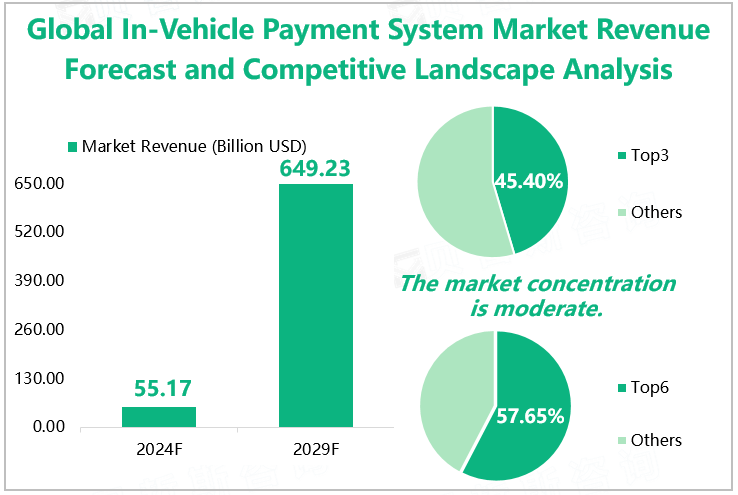In-vehicle payment system refers to a payment system integrated within a car. It utilizes advanced payment technology and in-vehicle communication devices to enable car owners to easily complete various transactions and payment operations while driving. These transactions not only include traditional scenarios such as refueling and parking, but may also extend to broader applications such as purchasing goods, subscribing to services, and paying fines.
Overview of Market Development
The in-vehicle payment system, as an important intersection of modern intelligent transportation and digital life, has brought great convenience to people's travel. In recent years, with the acceleration of automotive intelligence and networking, the application of in-vehicle payment systems has gradually become popular, and the market size has been expanding year by year.
According to our research data, the global in-vehicle payment system market revenue is expected to reach $55.17 billion in 2024, an increase of 53.54% compared to 2023. In the future, with the further pursuit of convenient and efficient payment methods by consumers, as well as the active promotion and application of in-vehicle payment systems by car manufacturers, the market is expected to expand rapidly. It is expected that the global in-vehicle payment system market revenue will increase to $649.23 billion by 2029.
Analysis of Market Competition Pattern
From the perspective of market competition, the global in-vehicle payment system market is moderately concentrated. Data shows that in 2023, the top 3 companies achieved a total revenue of $16.31 billion in the in-vehicle payment system market, with a total revenue share of 45.40%; The total revenue for in-vehicle payment systems of the top 6 enterprises was $20.71 billion, with a total revenue share of 57.65%. The top three companies were Daimler AG, Honda Motor Company, and General Motors Company. In 2023, these three companies accounted for 18.29%, 14.66%, and 11.45% of the global market revenue in the in-vehicle payment system market.
Global In-Vehicle Payment System Market Revenue Forecast and Competitive Landscape Analysis

Source: www.globalmarketmonitor.com
Segmented Market Analysis
From the perspective of product types, according to different payment methods, in-vehicle payment systems can usually be divided into NFC payment systems, QR code payment systems, and account payment systems. Among them, the QR code payment system holds the largest market share, with an estimated 43.17% in 2024.
From the perspective of application scenarios, in-vehicle payment systems are mainly used for parking payments, fuel payments, and high-speed traffic payments. Among them, parking payments account for the largest proportion, expected to reach 43.12% by 2024.
From a regional perspective, global in-vehicle payment systems are concentrated in three major regions: North America, Europe, and the Asia Pacific region. These three major regions collectively hold over 95% of the global market share. Among them, North America is the largest revenue market. Data shows that the revenue of the North American in-vehicle payment system market is expected to reach $20.01 billion in 2024, with an estimated market share of 36.28%.
Global In-Vehicle Payment System Segment Market Revenue and Share Forecast in
2024
|
|
Market Revenue (Billion USD)
|
Market Share
|
|
Segmented by Type
|
|
NFC Payment Systems
|
117.85
|
32.36%
|
|
QR Code Payment Systems
|
23.82
|
43.17%
|
|
Account Payment Systems
|
13.50
|
24.47%
|
|
Segmented by Application
|
|
Parking Payments
|
7.34
|
13.30%
|
|
Fuel Payments
|
23.79
|
43.12%
|
|
High-Speed Traffic Payments
|
21.11
|
38.26%
|
|
Others
|
2.94
|
5.32%
|
|
Segmented by Region
|
|
North America
|
20.01
|
36.28%
|
|
Europe
|
18.11
|
32.82%
|
|
Asia Pacific
|
14.33
|
25.98%
|
|
South America
|
1.59
|
2.89%
|
|
Middle East & Africa
|
1.12
|
2.03%
|
Source: www.globalmarketmonitor.com
Market Development Prospects and Trend Predictions
On the one hand, with the popularization of new energy vehicles and intelligent connected vehicles, the application scenarios of in vehicle payment systems will become more diverse and diverse; On the other hand, with the continuous breakthroughs and applications of technologies such as artificial intelligence and blockchain, the intelligence and automation level of in vehicle payment systems will be further improved. In addition, with the increasing global emphasis on environmental protection and sustainable development, in-vehicle payment systems will also pay more attention to the application and development of green environmental protection, energy conservation and emission reduction.
